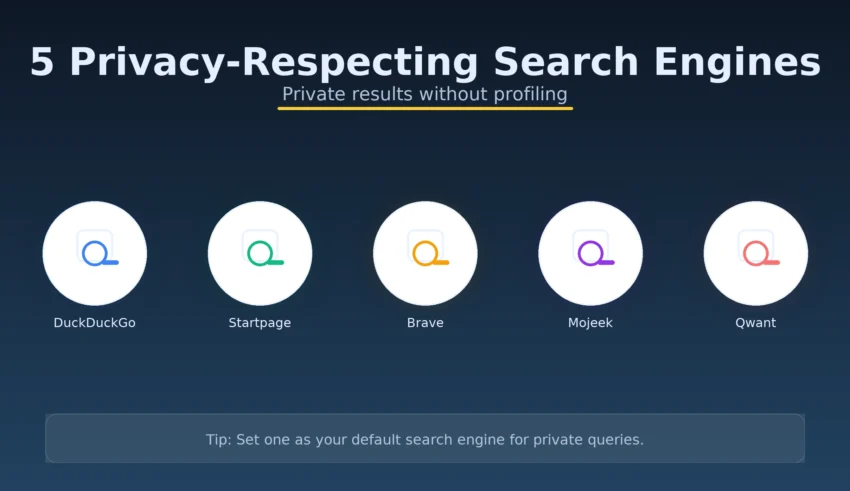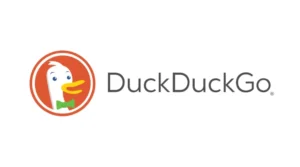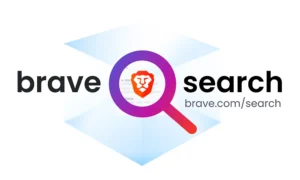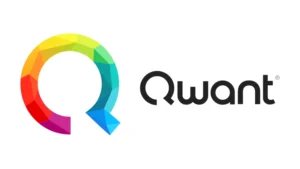
If you want useful results without being followed by behavioural ads, a privacy-respecting search engine is a practical upgrade. Below are five free options. For each one you’ll find how it works (index and business model), what personal data it typically collects, and quick tips to set it up. A popularity note helps you pick a sensible default.
What “privacy-respecting” usually means
- No personal profiles: queries are not tied to a persistent identity used for ad targeting.
- Minimal or anonymous logs: IP addresses are not retained long-term or are stripped/aggregated.
- No cross-site tracking: no third-party pixels/cookies that follow you across the web.
- Contextual ads or none: ads (if any) are based on the current search, not your history.
1) DuckDuckGo

How it works: DuckDuckGo (DDG) blends its own web crawler with syndicated coverage and ranks pages with freshness, authority, and engagement signals. It shows contextual ads based solely on the current query.
Data collected: No personal search profiles; no tracking cookies that follow you across sites. IP addresses aren’t stored to a personal record; aggregated metrics may be kept to operate the service.
Why choose it: Easy default with strong privacy stance, mobile apps, and a browser with tracking protection. Results are solid for general queries.
2) Startpage

How it works: Startpage is a privacy proxy to Google’s results. It submits your query to Google on your behalf and returns the page without sharing your IP or user agent with Google. “Anonymous View” lets you open results via a page proxy.
Data collected: “No tracking, no profiling, no storing of IP addresses.” Temporary, non-identifying technical data may be processed for anti-abuse and language relevance. Ads are contextual.
Why choose it: You prefer Google-class results but don’t want your searches tied to a Google account or IP.
3) Brave Search

How it works: Brave Search runs its own independent index and can blend third-party coverage where needed. “Goggles” let communities re-rank results to reduce bias. Free tier with private, query-based ads; paid ad-free tier available.
Data collected: No user profiling. Anonymous usage metrics help improve relevance. There’s an opt-in “Web Discovery Project” that shares de-identified data to improve the index.
Why choose it: Independent index with modern privacy defaults and customisable ranking.
4) Mojeek

How it works: UK-based engine with its own crawler and index (not a meta-search). It emphasises organic ranking and minimal UI, without profiling or behavioural ads.
Data collected: No tracking cookies; basic, non-identifying server logs for operations and security; no personal profiles.
Why choose it: True independence from big ad networks; simple and fast for many informational queries.
5) Qwant

How it works: European search engine with its own crawlers plus partnerships for coverage. Follows GDPR standards. Offers News, Images, and a “Qwant Junior” mode for children.
Data collected: No cross-site tracking or behavioural profiles; contextual advertising; limited technical data under EU rules.
Why choose it: Strong EU-centric privacy norms and multilingual coverage—especially practical if you’re in Europe.
Popularity: which private engines are most used?
Among privacy-focused engines, DuckDuckGo has for years been the most widely used globally, helped by easy browser integration and mainstream awareness. Startpage is popular with users who want Google-quality results through a privacy layer. Qwant is better known in parts of Europe, while Brave Search and Mojeek are growing, especially among users who value independent indexes. Exact shares vary by region and device, but this ordering is a practical rule of thumb.
Pros & Cons Comparison
How to get the best privacy in practice
- Use a privacy-friendly browser: enable tracker blocking and disable third-party cookies.
- Split contexts: separate profiles for work/personal/sensitive research.
- Add a VPN to encrypt traffic and hide your IP on public Wi-Fi; for maximum anonymity, use Tor Browser.
- Prefer preview/anonymous view links when available to reduce fingerprinting on destination sites.
- Limit extensions and review site permissions regularly.
Bottom line
Privacy-respecting search engines give you useful results without turning every query into an advertising dossier. If you want a simple mainstream replacement, try DuckDuckGo. If you prefer Google-class results through a privacy layer, choose Startpage. For an independent index with modern controls, Brave Search is compelling; if you prioritise independence and minimalism, try Mojeek. For EU-centric privacy and multilingual coverage, Qwant is a solid option. Whichever you choose, combine it with good browser hygiene—and enjoy searching without constant profiling.













